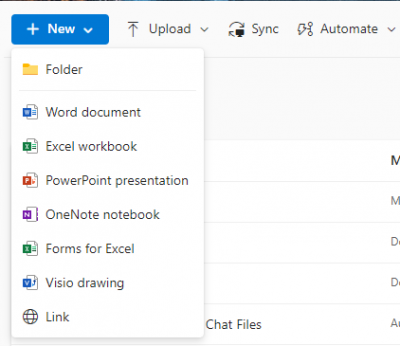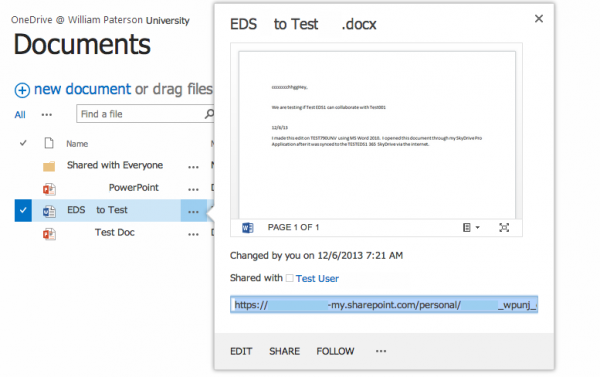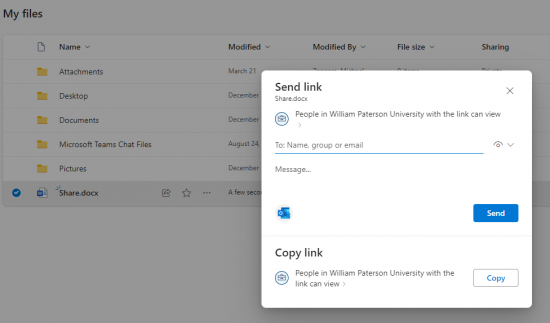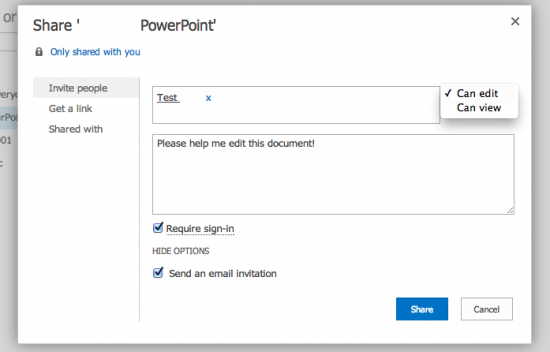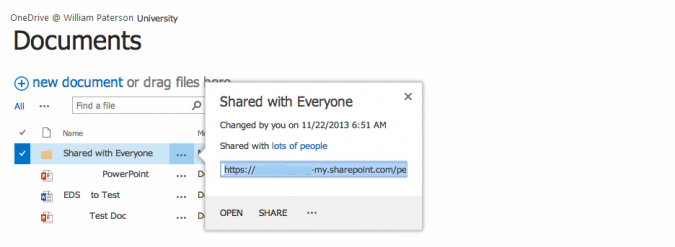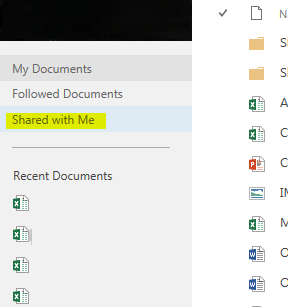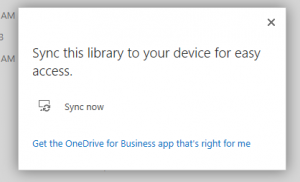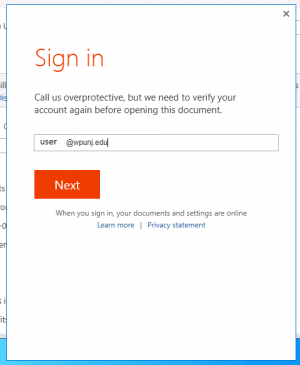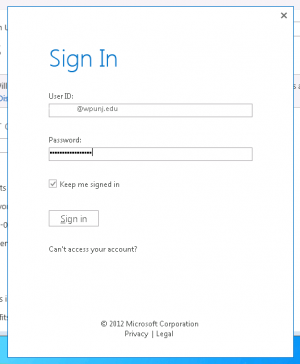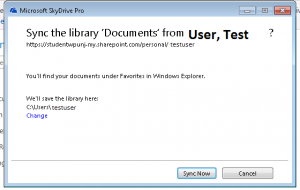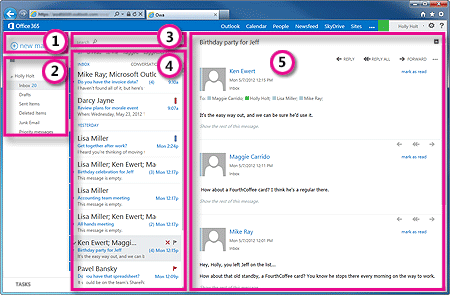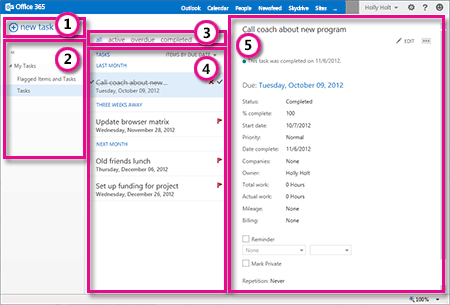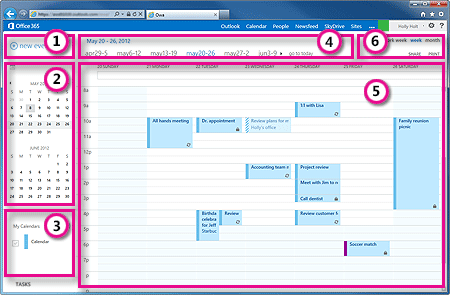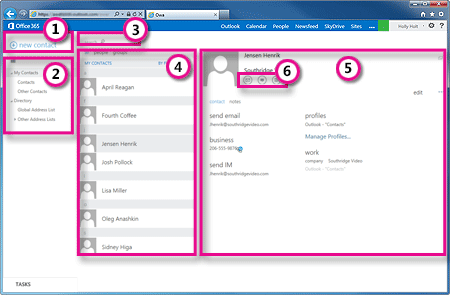Microsoft Office 365: Difference between revisions
Rosenberge (talk | contribs) |
Rosenberge (talk | contribs) |
||
| Line 46: | Line 46: | ||
*Sites | *Sites | ||
'''Please Note:''' Faculty/Staff email is still hosted through Microsoft Exchange. To access a faculty/staff email inbox, please visit www.wpunj.edu/email. | '''Please Note:''' Faculty/Staff email is still hosted through Microsoft Exchange. To access a faculty/staff email inbox, please visit [www.wpunj.edu/email www.wpunj.edu/email]. | ||
When logging into Office 365 with a faculty/staff account, the member's SkyDrive Pro is the first thing that is opened. | When logging into Office 365 with a faculty/staff account, the member's SkyDrive Pro is the first thing that is opened. | ||
Revision as of 13:58, 4 March 2014

If you are looking for the traditional Microsoft Office Suite, which is available as a download for full time students, please see the Microsoft Office 2013 article for instructions.
Microsoft Office 365 is a subscription-based online office and software plus services suite which offers access to various services and software built around the Microsoft Office platform. This service provides cloud storage and collaboration for both students and faculty members through their University accounts. Some of the features included in Office 365 are Outlook, Newsfeed, SkyDrive Pro, Sites and access to the Microsoft Office Web Apps. Both students and faculty member sign into Office 365 through the following site: https://login.microsoftonline.com . Please note that at this time, Outlook services in Office 365 are only available for student accounts. For more information, please see the faculty and staff section below section below.
Students
Student accounts in Office 365 offer access to the following features:

- Outlook
- Calendar
- People
- Newsfeed
- SkyDrive Pro @ William Paterson University
- Sites
When logging into Office 365 with a student account, the student's inbox through Outlook is the first thing that is opened.
Troubleshooting
If you are having difficulty logging into your email after following these steps:
- Click the following link to access your email: https://login.microsoftonline.com/
- Login with your full email address, username@student.wpunj.edu, and the same password as WP Connect
Please clear your cache and cookies on the browser you are using to access your email. Here are three short ‘how to’ videos with step by step instructions:
After deleting your cache on the appropriate browser, please attempt logging into your email once again. If you are still experiencing issues, please contact the Help Desk.
Faculty and Staff
Faculty/Staff accounts in Office 365 offer access to the following features:

- Office Online which includes Word, Excel, PowerPoint
- Newsfeed
- SkyDrive Pro @ William Paterson University
- Sites
Please Note: Faculty/Staff email is still hosted through Microsoft Exchange. To access a faculty/staff email inbox, please visit [www.wpunj.edu/email www.wpunj.edu/email].
When logging into Office 365 with a faculty/staff account, the member's SkyDrive Pro is the first thing that is opened.
SkyDrive Pro
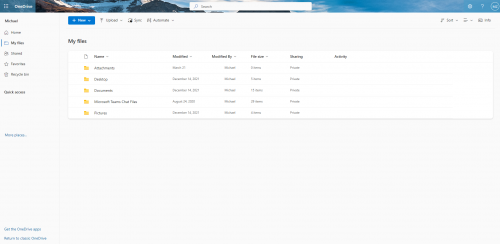
SkyDrive Pro is cloud storage provided by Microsoft intended for storing and organizing work/school related documents. SkyDrive Pro is managed by the University IT department, allowing for features such as direct access to the Outlook address book, etc. SkyDrive Pro is different from SkyDrive, which is intended for personal storage separate from your workplace. SkyDrive Pro is also different from your Sites, which is intended for storing team or project-related documents.Because of this, the documents stored through SkyDrive Pro are only accessible when using your University credentials.
Storage Capactiy
SkyDrive Pro for William Paterson is currently allocating 25GBs of space for document cloud storage.
Uploading and Creating Documents
To upload an exiting document to SkyDrive Pro, click on the + new document link.
In the following window, you will have the option to either create a new document using Office Web Apps or upload an existing document from your computer. Alternatively, you may also drag existing documents onto the SkyDrive Pro page when it is open in your browser.
Sharing
All files stored in SkyDrive Pro are private initially – only you can see them – unless you decide to share them. You can easily make a file available to everyone in your organization by placing it in the Shared with Everyone folder or you can share files with specified co-workers so you can collaborate on projects. Currently, the University does not allow you to share files with external users.
There are two ways to share documents 1) by copying and pasting a link to the document or 2) sending a sharing email through SkyDrive Pro.
Sharing a Document via Link
To send a link to a co-worker or peer, navigate to the document you would like to share and click on the three dots located next to the document. A window will appear showing you a preview of your document as well as other options. Below the preview you will find a link box that contains the link to your document. Copy the document link and paste it in a message or email in order to share it with someone.
Sharing a Document via Email
To send an email with a link to the document you would like to share, navigate to the document and click the three dots located next to the document title. Click on the SHARE link listed at the bottom of the preview window.
After clicking the SHARE link, an email options window will open.
In this window, you can select the level of permission the person you are sharing with has (Can Edit or Can View) and choose to include a personal message with your email. Be sure to make sure the "Send and email invitation" option is checked in order for a notification email to be sent to the person you are sharing with.
Placing documents into the "Shared with Everyone" folder will make those documents available to everyone in the University who has the link to your "Shared with Everyone" folder. You can find the link to your folder by clicking on the three dots located to the right of the folder.
By default, anyone looking at your "Shared with Everyone" folder has View Only access, meaning they cannot edit those documents.
You can view documents that have been shared with you by other people by navigating to the "Shared with Me" link located in the left column under the profile picture. Please note that documents that are recently shared with you might not show up instantly.
Syncing with OneDrive Pro Desktop Application
Syncing your OneDrive with the OneDrive Pro Application allows you to access your cloud based documents directly from your desktop. Having your document available on the desktop allows you to open and save your documents directly from the file structure on your desktop without having to log into the Microsoft Online webpage. Syncing with OneDrive Pro is only available to users with Office 2013 or the standalone OneDrive Application.
To sync your OneDrive library directly to your desktop:
- Log into your OneDrive at login.microsoftonline.com
- Navigate to the SYNC link located in the upper right-hand corner of the window, underneath your user name.
- When the Sync window appears, click SYNC NOW
- You will be prompted to login with your credentials. Be sure to enter the credentials associated with your Office 365 Account.
- A confirmation window will open asking you to initiate the Sync. In this box, you also have the option to change the location of the library on your machine.
- Once the sync completes, you will be able to access your OneDrive Pro documents directly from the SkyDrive Pro folder located under you Favorites. A green check mark indicates this document has successfully synced with the cloud.
Microsoft Office Web Apps
Office Web Apps are web applications that let you create, edit and share your Excel, Word, PowerPoint and OneNote files from any browser. Office Web Apps are an integral part of SkyDrive Pro and provide basic Office editing features.
Open an Existing Document in Web Apps
To open a document that currently exists in your SkyDrive Pro, navigate to the document and click on the title. The document will open in a preview window where you will see the EDIT DOCUMENT link in the menu bar.
Click on the "Edit in Word Web App" link in the drop down. The document will open in the Web Application in your browser tab.
Please Note: The ability to open and edit documents in fully functional Office Applications through SkyDrive Pro is currently only available for users with Office 2013.
Sites
Sites are designed to help organize documents in a central location for multiple people and groups to work on. Currently, Sites are managed by the IT department. To inquire about getting access to Sites, please submit a Web HelpDesk ticket.
Outlook
This portion of the Office 365 article will cover the basics of using mail, calendar, and contacts in Office 365. This pertains only to student accounts as faculty/staff accounts still use Microsoft Exchange to access their email, calendars and contacts.
1.Create a new message by clicking + new mail.
2.Folders. The folder list includes the folders in your mailbox and Favorites. It may include other folders, such as archive folders. You can collapse this pane by clicking the folder icon at the top. You can expand and collapse folders in this view by clicking the triangle icons next to the folder names.
3.Search window. Type what you want to search for here, such as the name of a person you want to find messages from, or text that you want to search for to find a particular message.
4.List of messages in the current folder. Each entry in the list view has additional information, such as how many messages there are in a conversation and how many are unread, or if there is an attachment, flag, or category associated with any messages in the conversation. A conversation can have one or more messages. When a conversation is selected, you can delete it, add a flag, or add a category by clicking the icons. At the top of the list view are filters that you can click to quickly find messages that are unread, that include your name in the To or the Cc line, or that have been flagged. In addition to the filters, you’ll see the name of the folder you’re viewing and the view that you’ve selected.
5.The reading pane is where the conversation that you’ve selected is displayed. You can respond to any message in the conversation by clicking the links at the top of the message.
Tasks
Tasks stores tasks that you create or that are sent to you, and also messages that you’ve flagged. To view your tasks, click Tasks below the folder list in the Outlook window.
1.Create a new task by clicking + new task.
2.Use this column to view flagged items and tasks, or just tasks.
3.Filters. Select the filter depending on what items you want to see. Tasks and flagged items that don’t have a date associated with them and that aren’t completed will appear only when you select all.
4.List of items that meet the current filter criteria. Click any item to view it in the reading pane. You can use the controls in the list view to make changes to an item’s status. For example, you can mark a task as complete, or remove a flag from a message.
5.The reading pane, where the content of the items you’ve selected is displayed. You can use the controls in the upper corner to make changes to the item if it’s a task. If it’s a message, the controls will be the same as you would see while reading your mail.
Calendar
1.Create a new event by clicking + new event. An event can be an appointment, a meeting, or an all-day event.
2.Use the calendars to navigate from one date to another. Shading will show you what week you’re currently viewing, and darker shading marks the current date. You can use the calendar icon at the top to collapse or expand this side of the calendar view.
3.You can view more than one calendar at a time. This section lets you add other people’s calendars and select which to display.
4.This is another area that you can use to navigate from one day to another. Click any of the dates to jump to that date. Or click the arrows on either end to see the dates before or after what’s displayed.
5.The main window, where calendars will be displayed.
6.Select the view you want, and share or print your calendar.
People
1.Create a new contact by clicking new contact.
2.All the places you can find contact information.
3.Search. Type a person’s name here to search for them in your contacts and in your organization’s directory.
4.List of all contacts in the current folder.
5.The contact card for the selected person.
6.Actions you can take directly from the contact card. Click the icons to send a message, start a chat session, or create a meeting request.
Newsfeed
The Newsfeed encompasses the social component of Office 365. Use the Newsfeed to follow people, documents, and tags to keep informed about activities and updates. On the main page of the Newsfeed, you primarily see posts created by people you’re following, and posts pertaining to other content you are following, such as tags and documents. In addition to the “Following” view, you might occasionally be interested in browsing the “Everyone” view, the organization-wide newsfeed.
References
For more detailed information about Microsoft Office 365, please visit the following Microsoft pages:
